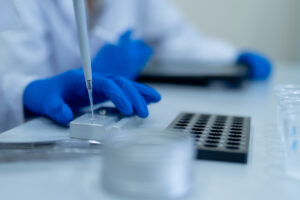Genetic counselors are highly trained and qualified individuals who can provide very high-quality support and genetic services for rare disease patients and their families. Knowing the right questions to ask, and preparing them beforehand, can help you and your genetic counselor work together to ensure the most accurate diagnosis possible.
Your genetic counselor will also ask you a lot of questions. These questions will be mainly about your health and your family medical history. They will want to know if there are any identified gene mutations in the family and any occurrence of rare diseases. They will also ask if there are any medical or health conditions passed down from generation to generation.
You will also be asked about the individual who you are attending the counseling for. If this is for your child, or yourself, they will ask questions about any unique symptoms of health conditions present.
Preparing for the questions a genetic counselor might ask you, is important. The more information a genetic counselor has, the better equipped they will be to help you, and the more accurate any potential genetic diagnosis will be.
Suggested questions to ask your genetic counselor
- Why are we here? You may have been referred to genetic counseling based on genetic screening or testing results, or you may be there because of the presence of unique symptoms. It is important you fully understand what the concerns are, what is the connection to a potential rare disease, and what the suspected conditions that a genetic counselor might be exploring for you. This is also important to enable you to optimize what your genetic counseling can tell you.
- What can they tell you about the rare disease in question? What does this disease look like, in terms of symptoms (both short and long-term), what does life for someone with this rare disease look like?
- Can this rare disease be inherited? If so, are future children at risk? How can this information be used to ensure healthy pregnancies and children in the future? Genetic counselors should be able to answer any questions you have about the cause or inheritance of a specific rare disease, except for where this cause is not known.
- How can you tell for sure if someone has a rare disease? This question is important, and genetic counselors should be able to walk you through the genetic testing and diagnosis process. Ask as many questions about the types of genetic testing, what the process involves, and their potential results, as much as possible. Genetic tests tend to be very specific, in terms of what they can identify, so make sure to understand which gene or chromosomal change is being tested for, and how. Within this, you should also understand how accurate a genetic diagnosis might be, for the rare disease in question. Be prepared to ask if misdiagnosis is a common issue, and if so why, and how can a delayed diagnosis be avoided.
- What is the difference between genetic screening and genetic testing? This is an important question because genetic screening often can only highlight or identify potential risk for developing a syndrome, while testing can be more conclusive.
- Are they open to online counseling options? This option can make regular genetic counseling services much easier for you and your family to access.
The role of a genetic counselor is a varied one. They are there to empower families and rare disease patients with information about genetic syndromes, including their causes and symptoms. You should ask them as many questions as you feel comfortable asking, and in return, you should expect them to ask you a lot of questions too.
Improving the accuracy of a genetic diagnosis requires a strong relationship between genetic counselor and patient, and their family where relevant. This means a lot of questions are asked on both sides.
When consulting with a genetic counselor, it’s important to gather as much information as possible to support your child’s development. One valuable tool to consider is the Child Development Checker app. This app is designed to analyze developmental delays and genetic concerns, offering insights that can be instrumental in understanding your child’s unique needs. The app also features a “Connect to Expert” option, providing personalized support from genetic professionals. By using this app, you can complement the guidance of your genetic counselor and ensure that you are taking proactive steps to support your child’s growth and development.
Evaluation
Don’t let your questions stay questions
Ease your concerns, gain a better understanding of your child’s development process, and connect with medical professionals in your area.



